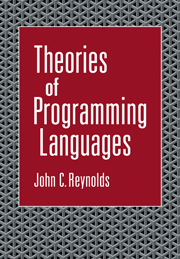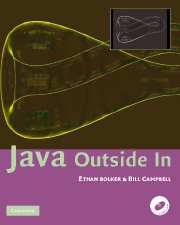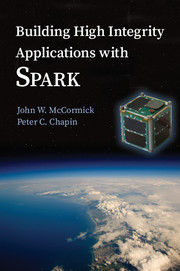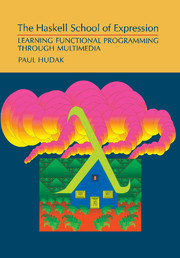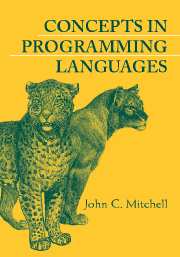
Concepts in Programming Languages
£70.99
- Author: John C. Mitchell, Stanford University, California
- Date Published: November 2002
- availability: Available
- format: Hardback
- isbn: 9780521780988
£
70.99
Hardback
-
For undergraduate and beginning graduate students, this textbook explains and examines the central concepts used in modern programming languages, such as functions, types, memory management, and control. The book is unique in its comprehensive presentation and comparison of major object-oriented programming languages. Separate chapters examine the history of objects, Simula and Smalltalk, and the prominent languages C++ and Java. The author presents foundational topics, such as lambda calculus and denotational semantics, in an easy-to-read, informal style, focusing on the main insights provided by these theories. Advanced topics include concurrency, concurrent object-oriented programming, program components, and inter-language interoperability. A chapter on logic programming illustrates the importance of specialized programming methods for certain kinds of problems. This book will give the reader a better understanding of the issues and tradeoffs that arise in programming language design, and a better appreciation of the advantages and pitfalls of the programming languages they use.
Read more- Extensive coverage and comparison of object-oriented languages such as C++ and Java
- Presents theoretical concepts, language design goals, design trade-offs, implementation issues, and effect on programming style
- Each chapter contains an extensive list of exercises
Reviews & endorsements
'… an extremely rich source of important information, subtle issues, and diverse and challenging exercises … the book is interesting, challenging and a pleasure to read.' JFP
Customer reviews
17th Oct 2024 by UName-23303
by the net browsing i know the concept of this review
Review was not posted due to profanity
×Product details
- Date Published: November 2002
- format: Hardback
- isbn: 9780521780988
- length: 540 pages
- dimensions: 262 x 186 x 31 mm
- weight: 1.126kg
- contains: 62 b/w illus. 14 tables 140 exercises
- availability: Available
Table of Contents
Part I. Functions and Foundations:
1. Introduction
2. Computability
3. Lisp: functions, recursion and lists
4. Fundamentals
Part II. Procedures, Types, Memory Management and Control:
5. The Algol family and ML
6. Type systems and type inference
7. Scope, functions and storage management
8. Control in sequential languages
Part III. Modularity, Abstraction and Object-Oriented Programming:
9. Data abstraction and modularity
10. Concepts in object-oriented languages
11. History of objects: simula and smalltalk
12. Objects and run-time efficiency: C++
13. Portability and safety: Java
Part IV. Concurrency and Logic Programming:
14. Concurrent and distributed programming
15. The logic programming paradigm and prolog by Krzysztof Apt
Appendix: additional programming examples
Glossary.-
General Resources
Find resources associated with this title
Type Name Unlocked * Format Size Showing of
This title is supported by one or more locked resources. Access to locked resources is granted exclusively by Cambridge University Press to lecturers whose faculty status has been verified. To gain access to locked resources, lecturers should sign in to or register for a Cambridge user account.
Please use locked resources responsibly and exercise your professional discretion when choosing how you share these materials with your students. Other lecturers may wish to use locked resources for assessment purposes and their usefulness is undermined when the source files (for example, solution manuals or test banks) are shared online or via social networks.
Supplementary resources are subject to copyright. Lecturers are permitted to view, print or download these resources for use in their teaching, but may not change them or use them for commercial gain.
If you are having problems accessing these resources please contact [email protected].
Sorry, this resource is locked
Please register or sign in to request access. If you are having problems accessing these resources please email [email protected]
Register Sign in» Proceed
You are now leaving the Cambridge University Press website. Your eBook purchase and download will be completed by our partner www.ebooks.com. Please see the permission section of the www.ebooks.com catalogue page for details of the print & copy limits on our eBooks.
Continue ×Are you sure you want to delete your account?
This cannot be undone.
Thank you for your feedback which will help us improve our service.
If you requested a response, we will make sure to get back to you shortly.
×
